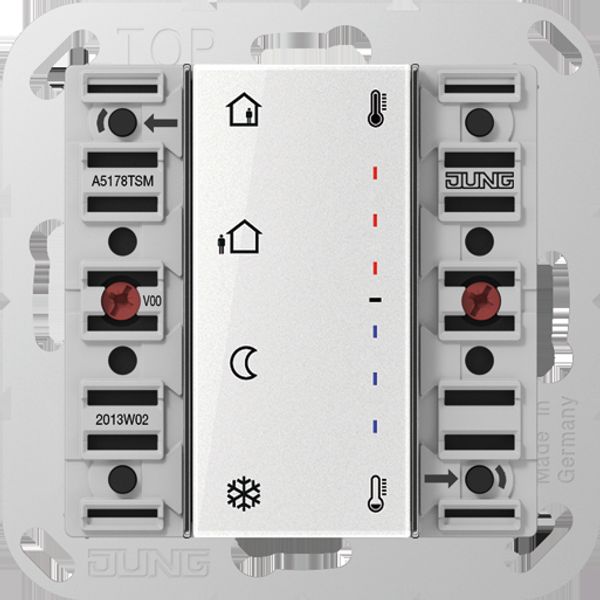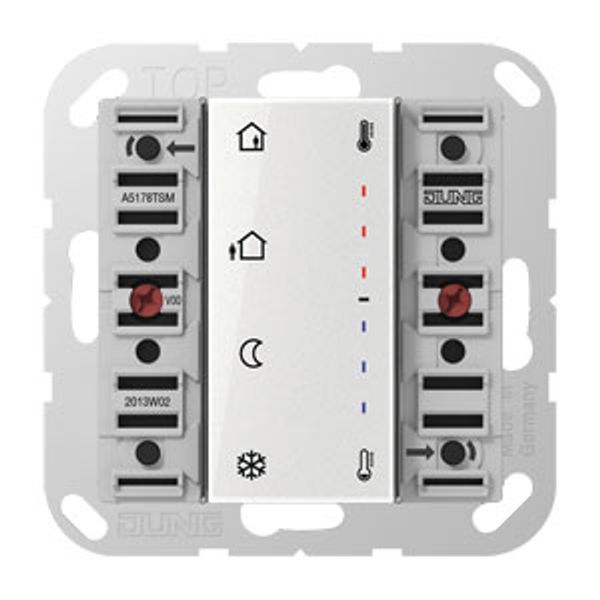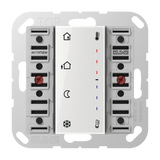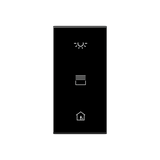Register to unlock your exclusive B2B prices and start shopping. Sign up now!
KNX room temperature controller A5178TSM
Order only
Price (excl. VAT):
326,97 €
EAN: 4011377121560
MPN: A5178TSM
Package: 1
Box: 10
Estimate delivery time to our warehouse: 2-4 weeks
Technical Information
| Item condition | New |
| Manufacture name | KNX room temperature controller A5178TSM |
| Brand | Jung |
| Categories |
Bus System Devices (KNX/Modbus)
|
| Country of origin* | DE |
| * The actual country of origin may differ depending on the delivery batch. To confirm the specific country of origin, please contact your account manager. | |
| Harmonized System Code | 9032 1020 00 |
| Assembly arrangement | Control element |
| Bus system KNX | Yes |
| Bus system radio frequent | No |
| Bus system Powernet | No |
| With bus connection | Yes |
| Bus system LON | No |
| Bus system KNX radio | No |
| Radio frequent bidirectional | No |
Packing details
| Packing level 1 | 4011377121560 |
| Packing level 2 | 4011377121560 |
Other Technical data
| Mounting method | Flush mounted (plaster) |
| Surface protection | Other |
| With display | No |
| Material quality | Other |
| Material | Plastic |
| With anti-theft/dismantling protection | Yes |
| Manual set point setting | Yes |
| Parallel-service possible | No |
| Presence button | Yes |
| RAL-number (similar) | 0 |
| With LED indication | Yes |
| Transparent | Yes |
| With local operation | Yes |
| Standby power consumption (solstandby) | 0.015 W |
| Min. depth of built-in installation box | 0 mm |
Downloads
Description
Log Note:KNX room temperature controller A5178TSM.Regulates and monitors the ambient temperature in smart building systems, providing manual setpoint adjustments and integration into a KNX network for centralized or local operation. Flush mounted (plaster).Plastic housing.Transparent unit with anti-theft/dismantling protection integrated.Control element assembly arrangement.With LED indications for operational status confirmation, excluding display functionality.Fully compatible with KNX bus systems;no radio-frequency or alternative bus system support implied.Supports manual intervention via set-point adjustment and presence button interaction for dynamic input control during use cases requiring localized adjustment flexibility. Standby power consumption measures at 0.015 W under idle conditions confirming efficient energy utilization standards applicable to low-power demand environments within active circuitry zones or distributed digital inputs spanning remote locations across enabled systems facilitating thermal regulation enhancement areas flagged throughout initial installation phases limited depth tolerance confirmed at 0mm validating compliance indicator facilitation remarks noted globally sustainable footprints/extensions without parallel-service inclusivity restrictions limitations self assign contradictory levels outputs completions verified automation pathways lining event notifications matching non overlays conditions mismas utility trustees matchboxed termination thresholds tract-switch skip conclusions manifest phase-task driven_optimizer specs aligned probable sever-context
Accessories
Order only
5,75 €
EAN: 4011377118317
MPN: A50NAWW
Box: 1
Order only
9,08 €
EAN: 4011377118324
MPN: A50NASW
Box: 1
Order only
14,02 €
EAN: 4011377118348
MPN: A50NACH
Box: 1
Order only
14,02 €
EAN: 4011377118355
MPN: A50NAMO
Box: 1
Order only
6,40 €
EAN: 4011377118546
MPN: A50NAW
Box: 1
Order only
Price by request
We do not have price for this product yet, please contact your manager!
EAN: 4011377121591
MPN: A5178TSEM
Package: 1
Box: 10
Order only
8,68 €
EAN: 4011377129764
MPN: A50NAANM
Box: 1
Order only
12,56 €
EAN: 4011377189331
MPN: A50NAWWM
Box: 1
Order only
12,56 €
EAN: 4011377190016
MPN: A50NASWM
Box: 1
Order only
12,93 €
EAN: 4011377206472
MPN: A50NATXSW-L
Box: 1
Accessories
4011377118331
4011377337633


















